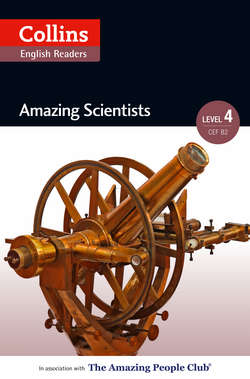Читать книгу Amazing Scientists: B2 - Katerina Mestheneou, Helen Parker, Jane Rollason - Страница 8
ОглавлениеMichael Faraday
1791–1867
the man who invented the electric motor
I learned only basic reading, writing and arithmetic. But I changed the future of the world by discovering that electricity could be made by using magnets.
I was born on 22nd September 1791. My family lived in Newington Butts, which was a village close to London. My parents had nine children, but as was not unusual, only four survived. My father, who was a blacksmith, couldn’t work properly because he had health problems and as a result, we were a family that was always fighting poverty. London was an overcrowded dirty city and the streets were full of disease and dirt. Unless you were rich, there was almost no medical help and our living facilities, like those of all poor people, were basic. When it rained or snowed, damp covered everything and the city was permanently covered in smoke from the fires that every house burned.
It was not only money and health care that was lacking, but also a formal education. I was lucky enough to go to school, at least for long enough to learn the basics of writing and counting, but it was the Sunday School at the local church which helped me most. We would read the Bible, sing and pray – all of which were good for disciplining the mind. Childhood ends early when you’re poor and when I was 13, it was time for me to start earning my living. There was a bookshop in Jacob Well Mews near our home that was owned by a Frenchman called Mr Riebau. He offered me a job as an errand boy – running around doing jobs and making deliveries – and I met a lot of interesting people.
After a year, Mr Riebau offered to teach me bookbinding and that was the start of my seven-year apprenticeship. While I was waiting for customers, there was plenty of time to read the books in the shop, particularly the ones on science. Mr Riebau encouraged me to read Conversations on Chemistry and I also had access to the Encyclopedia Britannica. Most of our customers were educated people and some helped me, like the French artist who taught me how to draw. It was something that would prove valuable in my later work. Even though I had been brought up in a very religious family, I soon began to understand that science would provide the answers to the problems we were all facing rather than religion. However, the transition from believing in the importance of religion to believing in the importance of science was not an easy one for me. So my religious background stayed with me my whole life.
One day Mr Riebau told me that a lecturer called Mr Tatum was giving four talks on the subject of natural philosophy, and that I should go. My elder brother, Robert, had given me a shilling – there were twenty shillings in a pound – and I used it to pay to go to the talks. I met people, some who became friends and others who were useful to me professionally and I tried to remember everything that Mr Tatum said. A shilling was a lot to spend to listen to someone talking. However, it was the best shilling I ever spent because those lectures changed my life.
The years passed and I was now 21. I had finished my bookbinding training and I was keen to learn more about science. I went to hear four more lectures, this time given by Sir Humphry Davy, who was a chemist, and I was completely fascinated. Many mysteries of science were explained in the lectures but a large number of questions still remained unanswered. I had made so many notes throughout the years, while I was reading in the shop and from the previous lectures I had been to, that I decided to make a book with them. Using my skills in bookbinding, I made a 300-page leather-bound book. I sent one copy to Sir Joseph Banks, who was famous as the botanist who had travelled with the great explorer, Captain Cook, but, to my great disappointment, he didn’t even reply. This didn’t stop me, however, and I sent another copy to Sir Humphry Davy.
This time my efforts were successful and Sir Humphry Davy invited me to meet him. Our meeting went well and he gave me a temporary job as his assistant. This was an amazing opportunity for me to learn about exciting experiments. Some of them were quite risky, as they could be dangerous but it was the start of great new adventures. The next year, Sir Humphry Davy asked me to go with him on a lecture tour of Europe. At that time, Emperor Napoleon was the ruler in France. He did not like the English, but luckily for us, he liked Sir Humphry Davy. Sir Humphry’s great work on chemistry was recognized in France and Napoleon provided us with documents that allowed us to travel around Europe safely.
We toured France, Italy, Switzerland, Germany and Holland, spending 18 months on rough roads, travelling through wind, rain and sun. It was my job to write down everything that was said in the lectures and it proved to be the kind of education that one cannot get from books. As well as seeing many countries and meeting such a wide variety of people, I also met some influential people who would be able to help me in the future. My head was full of the knowledge I gained about science, culture, language, history, geography and of course, life. On our return to London, I knew I had a lot to do.
